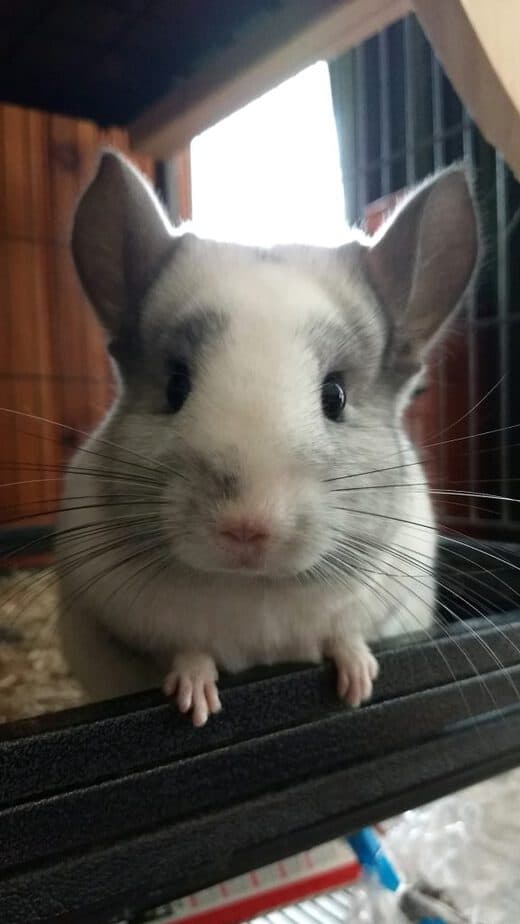"Chinchillas are small & energetic animals that sleep during the day & are active at night. They can make great pets if their activity level works for you.
...Over the years that you'll have a chinchilla as a pet, they will need regular visits to a veterinarian for wellness exams. Like any animal, they require a commitment to providing the proper diet & bedding, appropriate activity, & playtime.
How long do chinchillas live as pets?
Chinchillas typically live about 15 years, but living between 18 to 22 years is also not uncommon, says Pet Assured. This site also says that unlike cats & dogs, chinchillas do not need vaccines. But they can be spayed or neutered, which should be considered if you're keeping more than one together. Multiple females can get along well together, but males should be kept separately.
How much space do chinchillas need?
Chinchillas like to climb, so a tall cage with ladders & shelves is best. You can buy one or make your own chinchilla cage. Some people think that chinchillas are the size of hamsters, but Pet Assured says their body length can grow from 10 to 14 inches, & their height is 5 to 6 inches. When considering a habitat for your chinchilla, provide the biggest space based on what you have room for in your home with a minimum floor space being about 2 feet square.
Pet Assured explains that one of the things that makes chinchillas such desirable pets is their thick, soft fur. In the wild where they live in mountainous areas of South America this fur keeps them warm, but in a cage they can overheat. It's best to find a cool, quiet area for your cage with an ambient temperature under 80 degrees. Pet Care Veterinary Hospital says chinchillas need regular dust baths to help maintain their luxurious fur.
What do chinchillas eat?
Tex Vet Pets says chinchillas need plenty of roughage in their diet, which helps to keep both their teeth & gastrointestinal tract healthy. Offering as much fresh Timothy hay as they want to eat on a daily basis is essential. Pelleted food, which is also made of Timothy hay, is also a main part of the diet for adult chinchillas. To get the roughage, dark, leafy greens are best, & carrots can be considered an occasional treat.
Younger chinchillas under one year of age should eat alfalfa hay or alfalfa hay-based pellets. Pellet foods should be limited to 1 or 2 tablespoons but the pellets that contain nuts, seeds, or dried fruit should be avoided because they are low in nutrition & high in fat.
What are chinchilla personalities like?
Chinchillas are most active at dusk & dawn, & into the night... They also seem to be skittish creatures that generally do not like to be held, although they can become very attached to their owners if they are held regularly from a young age. Chinchillas are not unfriendly animals, they just have to be acclimated to human touch.
Chinchillas are very active & playful. Pet Care Veterinary Hospital says chinchillas love to jump & be up high & may even climb to the top of their food dishes for extra height. They can be trained to use an exercise wheel, although they do like to be let out of their cages. If you let them out, have them in a safe area where they can't get into trouble or get hurt or lost.
Can you train a chinchilla?
The website Little Pet Warehouse says chinchillas are highly intelligent animals that can be trained to do tricks. This website says it can be challenging to train chinchillas because although they are intelligent, they tend to do what they want rather than what the owner wants! Approach training using positive reinforcement, which can mean gentle handling & a treat they like, such as raisins, cut into small pieces (so they don't get too much).
They can be trained to use a litter box by placing some of the soiled substrate (cage bedding) into the litter area, & they can even recognize their name. To do this, say their name often, & when they come to you, give them a treat & praise. Approach it in the same way that you might approach training a dog: repetition, patience, practice, & rewarding behavior.
Bonding with your chinchilla
There's a website called Small Pet Select that talks about bonding with your chinchilla. Their best tips are to remember that in the wild chinchillas are prey animals, so their instincts are to be defensive. It can take time for them to learn to trust you. But providing food is often a great motivator for bonding!
Establish a routine for when you offer fresh food, water, fresh bedding, & dusting for baths. Say their name, & provide some treats. And remember, they will feel most comfortable if they are calm. Speak softly, move slowly, touch them gently, & be patient!"
Vanessa Salvia
6/2/2019
cuteness.com
Cute Critter Pics:


/GettyImages-103348485-5839cb0e5f9b58d5b14335b4.jpg)
/chinchilla-5a879fdb43a1030036a3efab.jpg)







No comments:
Post a Comment